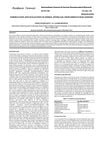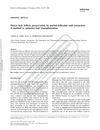 January 2021 in “Journal of cosmetology & trichology”
January 2021 in “Journal of cosmetology & trichology” L-(+)-Tartaric Acid may help increase certain hair growth genes without harming cells.

The hydrogel with 20% Hibiscus rosa-sinensis extract was the best for potential therapeutic use.
 April 2024 in “Authorea (Authorea)”
April 2024 in “Authorea (Authorea)” Stopping heptaminol medication reversed hair color loss in a patient on dialysis.
August 2024 in “International Journal of Pharmaceutics” The treatment promotes hair growth, improves hair density, and reduces skin irritation.
August 2018 in “Jundishapur journal of natural pharmaceutical products” Transfollicular drug delivery can improve medication absorption through hair follicles.
 August 2020 in “Research Square (Research Square)”
August 2020 in “Research Square (Research Square)” Neural progenitor cell-derived nanovesicles help hair growth by activating a key signaling pathway.
 25 citations,
May 1986 in “The American Journal of the Medical Sciences”
25 citations,
May 1986 in “The American Journal of the Medical Sciences” Minoxidil helps hair growth and boosts self-esteem in balding men.
 5 citations,
August 2013 in “The Journal of Pediatrics of Korean Medicine”
5 citations,
August 2013 in “The Journal of Pediatrics of Korean Medicine” The treatments helped the girl's hair grow back, but more research is needed for different types of hair loss.
 2 citations,
January 2023 in “BioMed Research International”
2 citations,
January 2023 in “BioMed Research International” Beetroot extract nanogel may help treat hair loss caused by testosterone.
14 citations,
November 2012 in “SLAS discovery” Some herbal extracts can promote hair growth and prevent hair loss.
 1 citations,
February 1993 in “Nursing Standard”
1 citations,
February 1993 in “Nursing Standard” Many drugs, not just chemotherapy, can cause reversible hair loss.
 19 citations,
April 2010 in “Journal of Dermatological Treatment”
19 citations,
April 2010 in “Journal of Dermatological Treatment” Partial hair follicle extraction can effectively double the number of hair follicles for transplants, with most surviving and growing normally after a year.
 27 citations,
June 2015 in “Revista Brasileira de Farmacognosia”
27 citations,
June 2015 in “Revista Brasileira de Farmacognosia” Safflower has been used in traditional medicine for centuries and shows promise in treating heart, brain, and inflammatory conditions, but more research is needed to ensure its safety.
 July 2024 in “Journal of Cosmetic Dermatology”
July 2024 in “Journal of Cosmetic Dermatology” Fractional laser therapy is a promising, effective, and minimally invasive treatment for hair loss.
 28 citations,
September 1998 in “Medical Clinics of North America”
28 citations,
September 1998 in “Medical Clinics of North America” Most hair loss can be diagnosed with patient history and physical exam, and a few common types make up most cases.
 14 citations,
January 2006 in “Skin pharmacology and physiology”
14 citations,
January 2006 in “Skin pharmacology and physiology” Procyanidin compounds from apples and barley promote hair growth and prevent hair cell death.
 13 citations,
July 2016 in “BMC Complementary and Alternative Medicine”
13 citations,
July 2016 in “BMC Complementary and Alternative Medicine” Hominis Placenta helps hair grow back by increasing cell growth and a specific growth factor.
 April 2017 in “InTech eBooks”
April 2017 in “InTech eBooks” Many people with hair loss experience scalp pain known as trichodynia, but the causes are unclear and treatments vary.
January 2020 in “Global dermatology” The growth factor cocktail significantly increased hair growth in patients with androgenetic alopecia.
 88 citations,
July 2019 in “International Journal of Molecular Sciences”
88 citations,
July 2019 in “International Journal of Molecular Sciences” Using human fat tissue derived stem cells in micrografts can safely and effectively increase hair density in people with hair loss.
 1 citations,
September 2023 in “Journal of cosmetic dermatology”
1 citations,
September 2023 in “Journal of cosmetic dermatology” Silybum marianum flower extract may help increase hair growth and decrease hair loss.
 1 citations,
October 2023 in “International journal of Ayurveda and pharma research”
1 citations,
October 2023 in “International journal of Ayurveda and pharma research” Herbal medications might be safer and more effective for hair loss than synthetic treatments.
 1 citations,
March 2009 in “Hair transplant forum international”
1 citations,
March 2009 in “Hair transplant forum international” The TrichoScan method effectively measures hair growth and helps choose patients for hair restoration surgery.
 7 citations,
April 2012 in “Clinical investigation”
7 citations,
April 2012 in “Clinical investigation” Transdermal testosterone can improve sexual desire in postmenopausal women but lacks long-term safety data and is not FDA-approved for this use.
 March 2021 in “PARIPEX INDIAN JOURNAL OF RESEARCH”
March 2021 in “PARIPEX INDIAN JOURNAL OF RESEARCH” Microneedling combined with platelet-rich plasma therapy is more effective for hair regrowth in androgenic alopecia than microneedling alone, but it's more painful.
 21 citations,
January 2018 in “The Korean Journal of Physiology and Pharmacology”
21 citations,
January 2018 in “The Korean Journal of Physiology and Pharmacology” Modified stem cells from umbilical cord blood can make hair grow faster.
 11 citations,
January 2004 in “Exogenous dermatology”
11 citations,
January 2004 in “Exogenous dermatology” Outside factors like grooming, chemicals, and the environment can damage hair and cause disorders.
 July 2023 in “Biomolecules”
July 2023 in “Biomolecules” The new "whisker follicle microinjection assay" can test how different biomolecules affect hair growth and color.
 6 citations,
February 2022 in “Journal of immunology research”
6 citations,
February 2022 in “Journal of immunology research” Exosomes from fat-derived stem cells can potentially improve hair growth and could be a new treatment for immune-related hair loss.
2 citations,
February 2024 in “Toxins” Bee venom can help stem cells promote hair growth.
























